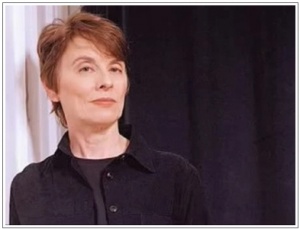One of our staff members is contributing considerably to a News Archiving service at Mu. Any well educated (Masters, PhD or above) users who wish to make comments on news sites, please contact Jim Burton directly rather than using this list, and we can work on maximising view count.
Camille Paglia: Difference between revisions
Jump to navigation
Jump to search
No edit summary |
|||
| (9 intermediate revisions by 5 users not shown) | |||
| Line 1: | Line 1: | ||
Paglia is an outspoken critic of | __NOTOC__[[Image:Camille paglia.jpg|thumb|Camille Paglia]]'''Camille Paglia''' (born 2 April 1947 in Endicott, New York) is a leading American [[Feminism|feminist]] academic, and an outspoken and often inopportune critic of anti-sex values, especially as applied to [[Boylove]]. Since 1984, Paglia has been a Professor at The University of the Arts in Philadelphia, Pennsylvania. Paglia has since backtracked slightly a la [[Peter Tatchell]], although it appears she would support a higher [[Age of Consent|age of consent]].<ref>https://www.rnz.co.nz/national/programmes/saturday/audio/2018642586/camille-paglia-free-women-free-men</ref> | ||
==On [[homosexuality|homosexuals]]== | |||
:''"Contemporary gays who try to distance themselves from this issue of boy-love are in effect committing cultural suicide. They're cutting themselves off from all the highest achievements of gay men..... Because I am a woman, and therefore I cannot be charged with man-boy love, I felt I had a moral obligation - and I don't recognize morality in most areas of life - a moral obligation to speak out against this kind of persecution in puritan Protestant culture, this persecution of a sensibility that as far as I can see has been intertwined with the highest achievements of art and intellect since the period of classical Athens".''<ref>https://www.ipce.info/library_2/files/paglia_guide.htm</ref> | |||
==See also== | |||
[[Category:Official Encyclopedia]][[Category:People]][[Category:People: Academics]][[Category:People: Sympathetic Activists]][[Category: | *[[Germaine Greer]] | ||
*[[Gayle Rubin]] | |||
==External links== | |||
*[http://www.randomhouse.com/pantheon/paglia/ Personal Site] | |||
*[http://en.wikipedia.org/wiki/Camille_Paglia Wikipedia article] - Broader detail on Paglia, including section on Child Sexuality. | |||
*[https://vdoc.pub/documents/free-women-free-men-sex-gender-feminism-hugpk9a6a5o0 Free Women, Free Men: Sex, Gender, Feminism] - book by Camille Paglia (2017) | |||
==References== | |||
{{reflist}} | |||
[[Category:Official Encyclopedia]][[Category:Gay]][[Category:People]][[Category:People: Academics]][[Category:People: Critical Analysts]][[Category:People: Sympathetic Activists]][[Category:People: American]] | |||
Latest revision as of 14:59, 19 May 2024

Camille Paglia (born 2 April 1947 in Endicott, New York) is a leading American feminist academic, and an outspoken and often inopportune critic of anti-sex values, especially as applied to Boylove. Since 1984, Paglia has been a Professor at The University of the Arts in Philadelphia, Pennsylvania. Paglia has since backtracked slightly a la Peter Tatchell, although it appears she would support a higher age of consent.[1]
On homosexuals
- "Contemporary gays who try to distance themselves from this issue of boy-love are in effect committing cultural suicide. They're cutting themselves off from all the highest achievements of gay men..... Because I am a woman, and therefore I cannot be charged with man-boy love, I felt I had a moral obligation - and I don't recognize morality in most areas of life - a moral obligation to speak out against this kind of persecution in puritan Protestant culture, this persecution of a sensibility that as far as I can see has been intertwined with the highest achievements of art and intellect since the period of classical Athens".[2]
See also
External links
- Personal Site
- Wikipedia article - Broader detail on Paglia, including section on Child Sexuality.
- Free Women, Free Men: Sex, Gender, Feminism - book by Camille Paglia (2017)